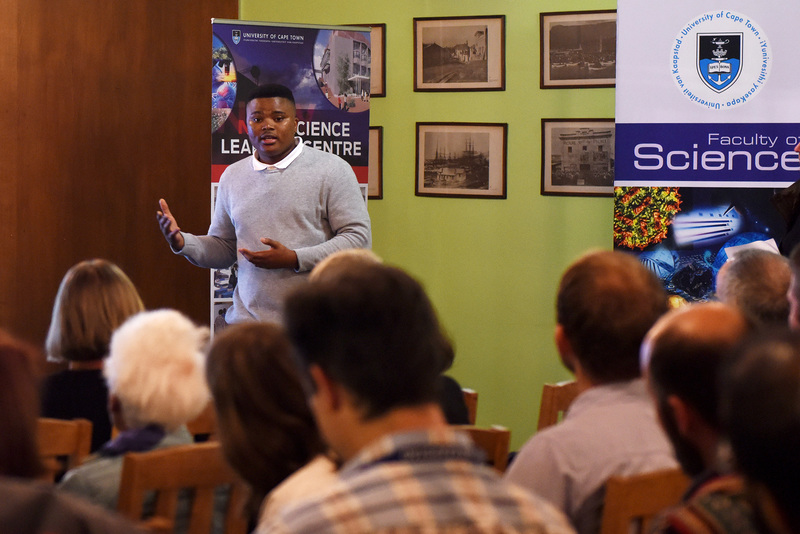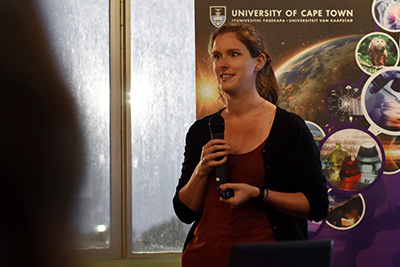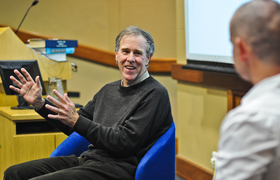ʻA neutron walks into a bar …ʼ
18 May 2018 | Story Helen Swingler. Photos Robyn Walker. Read time 7 min.
Science is an unusual bar-top topic but not at the UCT Club this week where science discussions eclipsed even the Sundowns–Barcelona game.
For three nights the club played host to Pint of Science, a recent drive to bring the weighty matters of chemistry, astrophysics, maths, geology, botany and the like directly to the public, via the publican, allowing leading scientists to present, discuss and take questions on their new discoveries and research.
Pint of Science has become an annual event; presented this year in 300 cities in 21 countries (run concurrently from 14 to 16 May). Cape Town is the only African city currently hosting Pint of Science (bottoms up to the Mother City), said chair Associate Professor Neil Ravenscroft of the Department of Chemistry in the Faculty of Science, the organisers of the event at UCT.
The event’s forerunner was Meet the Researchers, launched in 2012 by Dr Michael Motskin and Dr Praveen Paul at Imperial College London. They invited people affected by Parkinson’s, Alzheimer’s, motor neurone disease and multiple sclerosis into their labs to show them their research. It was inspirational for both visitors and researchers. The thinking was: If people want to come into labs to meet scientists, why not take the scientists to the people? And so, Pint of Science is now celebrated across bar counters the world over.
The second in the three-part series, Tuesday night’s presentation at the UCT Club was themed Atoms to Galaxies and featured nuclear physicist Dr Tanya Hutton, mathematician Mashudu Mokhithi and chemist Associate Professor David Gammon.
The elephants in your glass
A postdoctoral research fellow, Hutton’s current research focuses on the use of neutrons to solve real-world problems, such as cheap and clean energy, and drug and explosives detection.
She kicked off with the opening line of a joke, “A neutron walks into a bar …” Alas, the punchline was promised at the end of her presentation, just to keep the audience guessing.
Neutrons have existed since the beginning of the universe but were discovered only 86 years ago. These neutrally charged subatomic particles are essential to the structure of matter as we know it, she said.

“From atoms to pubs to power and to galaxies, neutrons are critical to the universe, their unique properties making them useful for everyday things like clean energy.”
Moving from the subatomic to the vastness of the universe with its incredibly dense neutron stars, Hutton used a down-to-earth example to illustrate their density.
“If you had a pint glass filled with neutron star matter it would be the equivalent weight of seven billion elephants.”
Never mind the elephants in the room ...
Those who’d waited for the punchline of her joke were rewarded: “A neutron walks into a bar and asks the bartender, ʻHow much for a beer?ʼ The bartender says, ʻFor you, there’s no charge.ʼ ”
“If you had a pint glass filled with neutron star matter it would be the equivalent weight of seven billion elephants.”
It’s all in the mindset
Mokhithi’s presentation skirted hard maths (even though he’s been lecturing on maths for two years) and looked instead at whether intelligence is fixed or malleable.
His research on mindset and academic achievement looks at how a student’s thinking about themselves can play a large role in determining their academic performance and success.
Intelligence is not just about genetics but is also influenced by mindset, he said.
Mindset extremes often determine whether students succeed or fail – the fixed mindset wants to look smart and perform; the growth mindset prefers learning from challenges as this builds competence. The fixed mindset is discouraged by negative feedback. The growth mindset appreciates even negative feedback as it’s part of learning.
“A growth mindset is key to successful learning and development.”
The often-negative academic stereotypes attached to black students and women students are also shaped by fixed or growth mindsets. For example, black students with growth mindsets performed better, Mokhithi found.
Structural and psychological factors also play a role. Students from wealthier families are more likely to have growth mindsets.
“I like to incorporate these insights in my lectures.”
Good carbs, bad carbs
Gammon is a carbohydrate chemist specialising in the structure and synthesis of biologically active carbohydrate. His presentation dealt with the thorny issue of carbs.
Are carbs bad for us? (In contemplating this question, his audience didn’t have to look further than the contents of their glasses to decide!) Not at all; they’re essential for good health, all the way from the carbs in mother’s milk that feed the set of microbes in the baby’s gut that helps to set the pattern for good health.
“Carbohydrates get some bad press these days,” said Gammon. “Let’s face it, many [Banting] people in Cape Town will tell you that you must avoid them … Just check out their red list! Then the simple carbohydrate sugar – or sucrose – is under siege, quite rightly. It’s clear that we eat far too much sugar, and the problem is being tackled now in various ways, including slapping taxes on sugar.”
The reality, said Gammon, is that carbs are fascinating molecules and the complexity and subtlety of their chemical structures sets them up for a diversity of essential roles in biological systems.
They’re essential to life in a rather basic way: right at conception when the lucky single sperm meets the ovum. There are carbohydrates on the surface of the ovum in the form of glycoproteins “and strong evidence that there is a moment of recognition, leading to adhesion – rather than just bouncing away – which then triggers a series of enzymatic events which break apart the boundary and admit the sperm to the point of contact with the ovum”.
They’re also important in disease states, where cell surfaces become modified as part of the disease process. A range of complex carbohydrates called glycans help us track this process.
“Changes in the surface glycans turn out, in many cases, to be ‘disease biomarkers’.”
These have important diagnostic implications and can allow very specific, targeted interventions.
“You could call this molecular diagnostics and itʼs more than just a pipe dream.”
 This work is licensed under a Creative Commons Attribution-NoDerivatives 4.0 International License.
This work is licensed under a Creative Commons Attribution-NoDerivatives 4.0 International License.
Please view the republishing articles page for more information.










